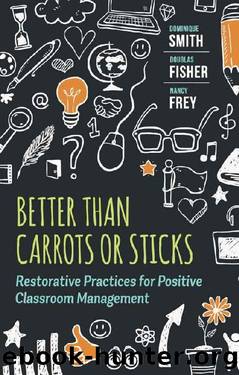Better Than Carrots or Sticks: Restorative Practices for Positive Classroom Management by Dominique Smith & Douglas Fisher & Nancy Frey

Author:Dominique Smith & Douglas Fisher & Nancy Frey [Smith, Dominique]
Language: eng
Format: epub
Tags: Education
ISBN: 9781416620631
Publisher: Association for Supervision & Curriculum Development
Published: 2015-08-16T22:00:00+00:00
Developing a Restorative Mindset
Developing a restorative mindset is more complex and personal than some might think. Beliefs about discipline are bound in our own experiences as children, educators, and parents. Discipline is informed by our sense of fairness, which we develop at a very early age: studies show that children as young as 15 months old can detect when food is not equally distributed to others (Schmidt & Sommerville, 2011). Although our beliefs about fairness mature over the years, we're never too far removed from the small child who wails, "It's not fair!" When students violate our expectations, we sense unfairness.
As educators, we also bring our own beliefs about control to bear on our approaches to discipline. Whereas some teachers hold that children are inherently good and will behave under the right conditions, others believe that students will naturally avoid work whenever possible and need to be constantly contained and redirected. Restorative practices can challenge such deeply rooted beliefs by asking us to shift our focus from rules to relationships. We must let go of the idea that accountability equals punishment (i.e., "teach him a lesson") and instead help students progress from acting out to remorse and repair (i.e., "I'm sorry, and I want to make amends").
Empowerment is at the center of restorative practices, as evidenced in the principle that all parties involved in a conflict must contribute to its resolution—victims, offenders, and anyone else even indirectly affected by it. Students need to be taught and given opportunities to use their problem-solving skills. It would be a mistake to wait for conflicts to arise before enacting restorative practices—that's what we did early on, and it was a mistake.
The International Institute for Restorative Practices identifies a continuum of practices ranging from informal to formal (Costello et al., 2010). In this chapter, we'll be focusing on the following first four informal practices:
Download
This site does not store any files on its server. We only index and link to content provided by other sites. Please contact the content providers to delete copyright contents if any and email us, we'll remove relevant links or contents immediately.
The Art of Coaching Workbook by Elena Aguilar(48067)
Trainspotting by Irvine Welsh(20057)
Twilight of the Idols With the Antichrist and Ecce Homo by Friedrich Nietzsche(17707)
Fangirl by Rainbow Rowell(7835)
Periodization Training for Sports by Tudor Bompa(7329)
Change Your Questions, Change Your Life by Marilee Adams(6642)
This Is How You Lose Her by Junot Diaz(5775)
Grit by Angela Duckworth(4738)
Red Sparrow by Jason Matthews(4668)
Asking the Right Questions: A Guide to Critical Thinking by M. Neil Browne & Stuart M. Keeley(4576)
Paper Towns by Green John(4169)
Room 212 by Kate Stewart(4108)
Ken Follett - World without end by Ken Follett(3973)
The Sports Rules Book by Human Kinetics(3589)
Housekeeping by Marilynne Robinson(3402)
The Motorcycle Diaries by Ernesto Che Guevara(3333)
Introduction to Kinesiology by Shirl J. Hoffman(3301)
Exercise Technique Manual for Resistance Training by National Strength & Conditioning Association(3292)
Double Down (Diary of a Wimpy Kid Book 11) by Jeff Kinney(3276)
